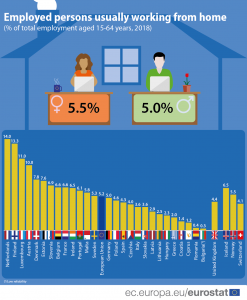The confinement imposed by the public authorities following the spread of the Coronavirus has caused profound changes in the market and the workplace. Companies had to reinvent themselves through teleworking at the risk of permanent closure. In France, more than a third of the working population say they have used teleworking during the two months of confinement. But now, where are French employees about "telework"?
What is telework?
Article, L. 1222-9 of the Labor Code stipulates that "Teleworking designates any form of work organization in which work which could also have been carried out on the employer's premises is carried out by an employee outside the employer's premises. these premises on a voluntary basis using information and communication technologies".
This teleworking must be set up "as part of a collective agreement or, failing that, as part of a charter drawn up by the employer after consulting the social and economic committee, if there is one."
Telecommuting existed long before the Coronavirus in France. Its proportion was lower than it is with the imposition of confinement. Many sectors, especially technology companies, practice teleworking. Meetings by videoconference, automatic work platforms existed long before COVID.
According to a survey conducted by Forum Vies Mobiles, only 7% of French employees practice teleworking before confinement. In 2018, Forum Vies Mobiles conducted another study on working conditions in Ile de France. 45% of its inhabitants wish to leave the Ile de France for the too stressful rhythms of life, pollution, the cost of real estate, or car traffic.
Telecommuting has beneficial effects on the environment. According to a study conducted by Ademe in 2015 on teleworking and the environment. Teleworking allows "to reduce by approximately 30% the environmental impacts associated with home-office journeys". The study goes one step further by specifying that: "Over 2.9 teleworked days per week, this represents a potential saving of 787 kg of CO2 per individual and per year (compared to approximately 12.2 t of CO2 in total per individual and per year).
Difference Between Freelancing and Telecommuting
Freelancing is performing work for clients on an as-needed or contract basis. You are not a permanent employee of the client. You are hired to perform a job (or group of jobs) for an agreed pay rate, after which the client may or may not hire you for further work.
Unlike freelancer, freelancers, teleworkers,
or " remote workersmanent, contract with the company. The concept of telework has two advantages. The company is not obliged to offer a higher salary to employees working from home. But the employee is satisfied because he is saved from overhead costs in terms of time spent on transport and money.
In 2019, there were nearly 930,000 freelancers in France, an increase of 145% in 10 years. Almost every year, 50,000 people cross the threshold of freelancing in France. In a malt study, 88% of freelancers no longer want a permanent contract. 90% of people said they were freelancing by choice.
Telecommuting before COVID
In France, a Eurostat study in 2018 shows that the percentage of people who work from home is 6.6%. Compared to other Europeans, working from home seems more popular in France than in Germany (5%) or the United Kingdom (4.4%).
Holland has the most popular teleworking; 14% of Dutch people telework, followed by Finland with 13.3%. The European average for people who work from home is 5.2%.
A study by Statista has confirmed that remote work is gaining more and more ground in France. In two years, the share of remote workers in France increased from 25% in 2017 to 29% in 2019. While 54% of employees surveyed indicated that the absence of daily commuting is the main advantage of working remotely, 36% of employees are also interested in the flexibility of working hours.
Teleworking during confinement
If globally, nearly 40% of the population resorted to teleworking during confinement. In a study by the Ministry of Labor with a sample of 14,000 people, the communication sector comes first, with 63% of employees teleworking. Next, the insurance and financial activities sector follows with 55%. The accommodation has the lowest proportion of teleworkers, only 6% of employees. Construction and the food industry are at the same level; 12% employees.
Motivations for telecommuting
Beyond the confinement which forced French employees to work remotely. Other factors are also preponderant in the analysis of the choice of French people to telecommute. In a study conducted by the flexible office operator, Deskeo, on a population of 2,915 people, 38% say they telework to save time in transport. 27% to work in peace and 19% to organize themselves more freely.
In addition to the absence of commuting, a 2019 survey found that working remotely allowed employees to better balance their work and private life (44%), to be less stressed (31%), to have more autonomy in their work (25%), to be more productive (19%) and more motivated (6%). In the same survey, 6% of employees said they saw no benefit from working remotely.
Post-lockdown teleworking
Although 85% of those who teleworked in France say they want to continue to do so, there has been a 12% drop in the number of teleworkers. What explains such a fall after confinement?
The Cabinet Valoir report showed that the switch to teleworking during the confinement period led to a loss of 1% in worker productivity on average. It has been observed that workers who live with children lose 2% in productivity, and those who live alone lose up to 3% in productivity. In addition, only less than 10% of respondents say they have not worked past 7 p.m.
Regarding technology use, employees spend only 3% of their time on technology-related telecommuting issues. The Cabinet Valoir report also stated that only 12% of people use online document-sharing and collaboration tools like Slack, Monday.com, and Google Docs.
The law and telework
Recently, the MiTheor tweeted: "In heirecently ghtened and maximum alert zones, employers and employees must, as much as possible, resort to teleworking." Telework is encouraged, but it is not imposed on companies. The Minister also stressed that telework is not a panacea.
At the legal level, the conditions for teleworking are defined. Amended by Ordinance No. 2017-1387 of September 22, 2017 – art. 21, "In the event of exceptional circumstances, in particular the threat of an epidemic, or in the event of force majeure, the implementation of teleworking may be considered as an adaptation of the workstation made necessary to allow the continuity of the activity of company and guarantee the protection of employees. »
About the rights of teleworkers, ordinance no. 2017-1387 of September 22, 2017 – art. 21 provides:
1° To inform the employee of any restriction on the use of IT equipment or tools or electronic communication services and of the sanctions in the event of non-compliance with such restrictions;
2° To give him priority to occupy or resume a position without teleworking which corresponds to his professional qualifications and skills and to inform him of the availability of any position of this nature;
3° To organize an annual interview which relates in particular to the conditions of activity of the employee and his workload.
The future of telework in France
Although the number of teleworkers fell by more than 10 points after confinement, the proportion is still interesting compared to previous years. In addition, it can also increase drastically in the event of a new wave, and the economies will be forced to confine themselves.
The future of remote work is different for all sectors. It has been noticed that sectors like communication, digital marketing, and BPO will continue to evolve even without confinement. Other sectors favor face-to-face because it promotes greater efficiency than teleworking.
The only certainty: telework has become an alternative to office space. What technologies should companies arm their employees for telecommuting to deliver the same or better performance than face-to-face work?




